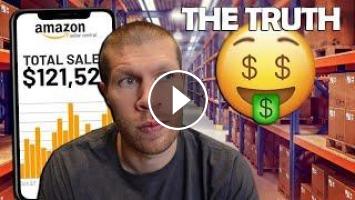Most Profitable Way to Sell on Amazon (Wholesale vs. Arbitrage vs. Private Label) 6 YEAR CASE STUDY
????Start a 6 Figure Wholesale Business on Amazon: https://bryan-guerra.teachable.com/p/wholesalesellerpro
????Start a 6 Figure Online Arbitrage Business: https://bryan-guerra.teachable.com/p/onlinearbitragepro
????Want 1 on 1 Mentorship from Bryan? Book a Call: https://clarity.fm/bryanguerra1
????????????????Free Discord (No Hidden Upsells - Just a community to talk eCom and share what's currently working vs. what's not): https://discord.gg/N8A9SWe8UK
I’ve talked about Selling Wholesale on Amazon FBA a lot of this channel. I’ve also talked about doing online arbitrage and shipping it into Amazon FBA a lot too….but lately in the discord chat I’ve been getting a lot of questions on my experience starting a few different private label products a few years ago….and whether or not I think it’s still a viable business model that people should try to get into….or if they shouldn’t waste their time and selling online arbitrage products or wholesale products is more worth it.
So in this video, we'll be discussing three different business models and comparing the benefits and drawbacks of each….to give you a clear cut winner!
First let’s discuss Selling Wholesale on Amazon FBA
Selling wholesale with Amazon FBA is a business model where you buy products in bulk from a manufacturer or distributor and then sell those products on Amazon. One of the key benefits of this model is that you can buy products at a lower price due to the bulk purchasing power you have with these companies….not to mention the fact that as you build up a good relationship with them, you can slowly get even cheaper prices which increases your profit margins significantly if you’re buying a lot of inventory.
Another key benefit of this is you don’t actually need to run any ads to your products to generate sales….or even build the brand at all….simply b/c you’re sourcing products that already have demand on amazon and typically already have a recognizable brand name. There’s a TON of scalability here. It’s not abnormal at all for normal people to hop into this and a few years later their sales are in the millions. I see it happen ALL THE TIME.
One of the main drawbacks of this….is that you'll be competing with other sellers who are also selling the same products. Also, some manufacturers may require a minimum order quantity, which means you may have to invest a large amount of money upfront….depending on the product and the specific distributor. But perhaps the most worrisome part of this for newer sellers is the fact that you’re more invested into a product listing (b/c you’re often buying more inventory for each listing)….which means if you miscalculated your competion or the opportunity on this listing, it can be a more costly error than if you did that on say an online arbitrage listing.
Which brings me to Selling Online Arbitrage on Amazon FBA
This is the very first way I got started on selling on Amazon. I still think it’s great for beginners trying to get into ecommerce and learn the ropes of how to make profitable buys, learn amazon through actually doing (which is the best way), and mitigate their risk heavily in the process.
With this business model where you buy products from online retailers and then resell those products on Amazon. One of the benefits of this model is that you can find products at a lower price than you would if you were buying them from a manufacturer or distributor. This is because you're often taking advantage of sales, clearance items, and other discounts. Another major benefit for beginners is that you’re not “married” to a listing a lot of times since you typically don’t source that many units for each listing. That gives you more flexibility….and a lot more room to make errors….And they won’t be as costly if you do mess up a buy. You can chalk it up to a learning experience and it most likely won’t be a big deal.
However, there are also some drawbacks to selling online arbitrage products. One of the main drawbacks is that you'll need to do a lot of research to find profitable products…mainly b/c it’s a lower barrier to entry business….so you’ll be competing with a lot of other sellers (that wouldn’t otherwise be on wholesale listings - for example). You'll also need to be careful about the condition of the products you're buying, as Amazon has strict rules about selling used or damaged items. Finally, you'll need to be able to move quickly to take advantage of sales and other opportunities….and make sure your products get into FBA in a timely fashion. Because A LOT can change quickly on an Amazon listing that is selling elsewhere for cheaper.
All in all, this business model is a GREAT way to get started selling on amazon…..and learn the ropes quickly while making some money. But it is tough to scale it to a significant amount without spending astronomical amounts of time.
????Start a 6 Figure Wholesale Business on Amazon: https://bryan-guerra.teachable.com/p/wholesalesellerpro
????Start a 6 Figure Online Arbitrage Business: https://bryan-guerra.teachable.com/p/onlinearbitragepro
????Want 1 on 1 Mentorship from Bryan? Book a Call: https://clarity.fm/bryanguerra1
????????????????Free Discord (No Hidden Upsells - Just a community to talk eCom and share what's currently working vs. what's not): https://discord.gg/N8A9SWe8UK
I’ve talked about Selling Wholesale on Amazon FBA a lot of this channel. I’ve also talked about doing online arbitrage and shipping it into Amazon FBA a lot too….but lately in the discord chat I’ve been getting a lot of questions on my experience starting a few different private label products a few years ago….and whether or not I think it’s still a viable business model that people should try to get into….or if they shouldn’t waste their time and selling online arbitrage products or wholesale products is more worth it.
So in this video, we'll be discussing three different business models and comparing the benefits and drawbacks of each….to give you a clear cut winner!
First let’s discuss Selling Wholesale on Amazon FBA
Selling wholesale with Amazon FBA is a business model where you buy products in bulk from a manufacturer or distributor and then sell those products on Amazon. One of the key benefits of this model is that you can buy products at a lower price due to the bulk purchasing power you have with these companies….not to mention the fact that as you build up a good relationship with them, you can slowly get even cheaper prices which increases your profit margins significantly if you’re buying a lot of inventory.
Another key benefit of this is you don’t actually need to run any ads to your products to generate sales….or even build the brand at all….simply b/c you’re sourcing products that already have demand on amazon and typically already have a recognizable brand name. There’s a TON of scalability here. It’s not abnormal at all for normal people to hop into this and a few years later their sales are in the millions. I see it happen ALL THE TIME.
One of the main drawbacks of this….is that you'll be competing with other sellers who are also selling the same products. Also, some manufacturers may require a minimum order quantity, which means you may have to invest a large amount of money upfront….depending on the product and the specific distributor. But perhaps the most worrisome part of this for newer sellers is the fact that you’re more invested into a product listing (b/c you’re often buying more inventory for each listing)….which means if you miscalculated your competion or the opportunity on this listing, it can be a more costly error than if you did that on say an online arbitrage listing.
Which brings me to Selling Online Arbitrage on Amazon FBA
This is the very first way I got started on selling on Amazon. I still think it’s great for beginners trying to get into ecommerce and learn the ropes of how to make profitable buys, learn amazon through actually doing (which is the best way), and mitigate their risk heavily in the process.
With this business model where you buy products from online retailers and then resell those products on Amazon. One of the benefits of this model is that you can find products at a lower price than you would if you were buying them from a manufacturer or distributor. This is because you're often taking advantage of sales, clearance items, and other discounts. Another major benefit for beginners is that you’re not “married” to a listing a lot of times since you typically don’t source that many units for each listing. That gives you more flexibility….and a lot more room to make errors….And they won’t be as costly if you do mess up a buy. You can chalk it up to a learning experience and it most likely won’t be a big deal.
However, there are also some drawbacks to selling online arbitrage products. One of the main drawbacks is that you'll need to do a lot of research to find profitable products…mainly b/c it’s a lower barrier to entry business….so you’ll be competing with a lot of other sellers (that wouldn’t otherwise be on wholesale listings - for example). You'll also need to be careful about the condition of the products you're buying, as Amazon has strict rules about selling used or damaged items. Finally, you'll need to be able to move quickly to take advantage of sales and other opportunities….and make sure your products get into FBA in a timely fashion. Because A LOT can change quickly on an Amazon listing that is selling elsewhere for cheaper.
All in all, this business model is a GREAT way to get started selling on amazon…..and learn the ropes quickly while making some money. But it is tough to scale it to a significant amount without spending astronomical amounts of time.
- Catégories
- E commerce Amazon















Commentaires